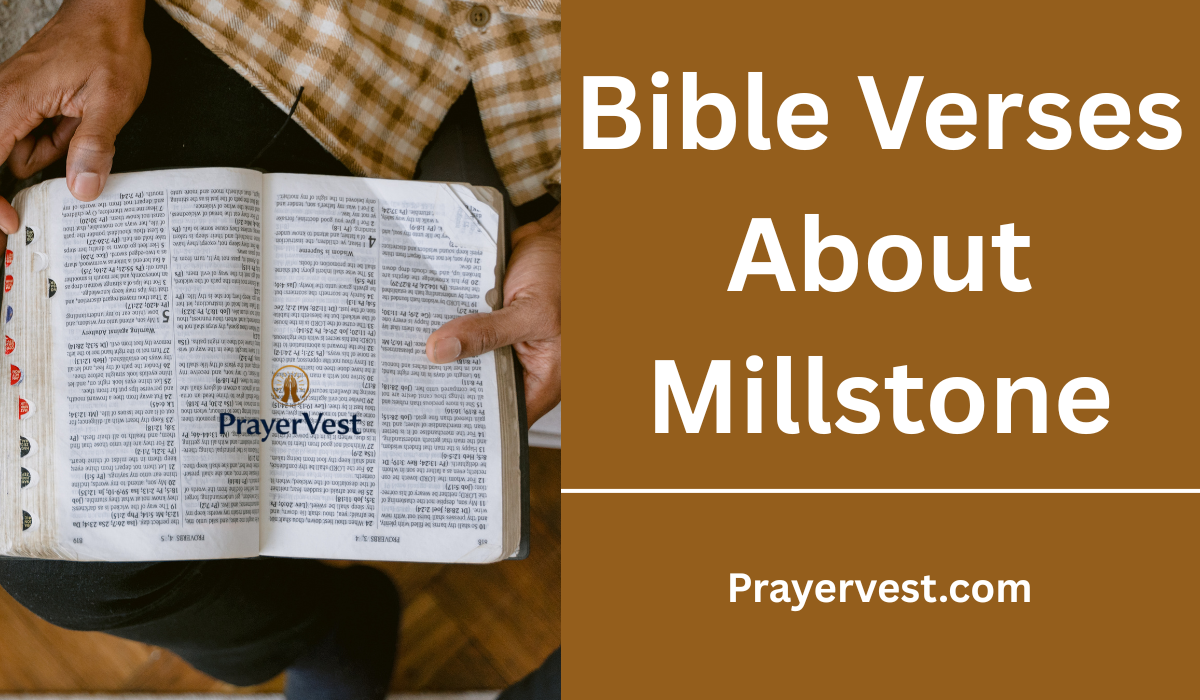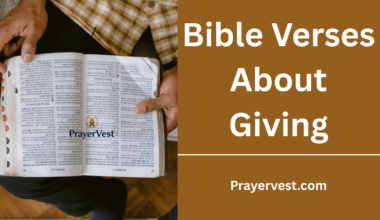Scripture uses the millstone as a potent metaphor for judgment, accountability, and the weight of repercussions. In the past, millstones—big, heavy stones that needed stamina and power to operate—were crucial instruments for turning grain into flour. The Bible frequently uses millstones to illustrate severity, responsibility, and the effect of one’s actions on others because of their substantial weight and common usage. These passages demonstrate how seriously God takes issues of justice and righteousness.
The millstone becomes a sobering image in Jesus’ teachings. He cautions that it is a serious crime deserving of severe punishment to cause spiritual injury, especially to the weak. The weight of a millstone fastened around the neck emphasizes the gravity of drawing people away from God by depicting overwhelming and irrevocable consequences. Scripture emphasizes the importance of protecting the defenseless and upholding integrity in leadership and discipleship through these cautions.


The Bible’s use of millstone imagery also serves as a reminder that oppressive and evil regimes will eventually be destroyed by God. Millstones served as symbols of everyday labor and economic life in addition to being tools for sustenance. Scripture uses the removal, breaking, or tossing of millstones to symbolize the collapse of corrupt, wicked, and unfair civilizations. These lines exhort believers to have faith that God is aware of all injustices and that His punishment for those who misuse authority will be severe, just, and final.
40 Inspiring Bible Verses About Millstone (2026)
1. Deuteronomy 24:6
“Do not take a pair of millstones—not even the upper one—as security for a debt, because that would be taking a person’s livelihood as security.”
In ancient Israel, a millstone was an essential tool used daily to grind grain into flour. It represented survival and daily sustenance. God commands Israel not to seize a millstone as collateral, emphasizing that no financial agreement should jeopardize someone’s ability to provide for their family. This law expresses God’s concern for human dignity, compassion toward the poor, and the protection of their essential means of life.
2. Job 41:24
“Its chest is hard as rock, hard as a lower millstone.”
In this passage describing Leviathan, Job illustrates the creature’s terrifying strength and impenetrable defense. The lower millstone—known for its weight and hardness—symbolizes something immovable and powerful. This metaphor highlights God’s sovereignty as the only One capable of controlling forces beyond human comprehension. It reminds readers of the vast gulf between human limitation and divine authority.
3. Isaiah 47:2
“Take millstones and grind flour; take off your veil. Lift up your skirts, bare your legs, and wade through the streams.”
Once a powerful empire, Babylon is here humbled by God, reduced to servant-level labor such as grinding grain with millstones—work typically done by the lowliest women. The imagery conveys humiliation, loss of honor, and a reversal of status. God declares that no nation, no matter how proud, can exalt itself above His judgment or escape the consequences of prideful rebellion.
4. Jeremiah 25:10
“I will banish from them the sounds of joy and gladness, the voices of bride and bridegroom, and the sound of millstones and the light of the lamp.”
The sound of millstones grinding grain symbolized daily life, provision, and community flourishing. Here, God warns of total desolation due to Israel’s disobedience. The silence of millstones represents the removal of God’s blessing and the collapse of normal living. This powerful image emphasizes the seriousness of persistent rebellion against God’s covenant.
5. Matthew 18:6
“If anyone causes one of these little ones—those who believe in me—to stumble, it would be better for them to have a large millstone hung around their neck and to be drowned in the depths of the sea.”
Jesus issues a severe warning against harming the vulnerable—especially His followers. The millstone referenced is the massive stone turned by a donkey, far too heavy for a person to lift. The imagery conveys total and irreversible judgment. Christ’s words highlight God’s fierce protection over those who trust in Him and the serious accountability required of spiritual leaders and influencers.
6. Luke 17:2
“It would be better for them to be thrown into the sea with a millstone tied around their neck than to cause one of these little ones to stumble.”
Echoing His earlier teaching, Jesus once again stresses the severity of spiritual harm inflicted upon the innocent or vulnerable. This verse emphasizes accountability within God’s kingdom—especially for those who influence others. Leading someone into sin, doubt, or spiritual injury is portrayed as a crime so serious that a swift and irreversible drowning would be preferable to the judgment awaiting the offender. It is a sobering reminder of the responsibility that comes with leadership, parenting, teaching, and discipleship.
7. Revelation 18:21
“Then a mighty angel picked up a boulder the size of a great millstone and threw it into the sea, and said: ‘With such violence the great city of Babylon will be thrown down, never to be found again.’”
In Revelation, Babylon symbolizes corrupt worldly power at its peak—immorality, greed, and spiritual deception. The dramatic image of a millstone-sized stone cast into the sea portrays the sudden and permanent fall of godless empires. God’s justice is swift, powerful, and final. No political system, city, or institution built on rebellion against Him can stand forever.
8. Judges 9:53
“But a woman dropped an upper millstone on his head and cracked his skull.”
This account from the violent period of Israel’s Judges reveals how God often uses unexpected people and ordinary objects to bring justice. Abimelech, a ruthless leader with ambitions beyond God’s purpose, meets his end by a simple millstone. The scene demonstrates God’s ability to overturn human pride, dismantle unjust authority, and use the overlooked and underestimated to accomplish His purposes.
9. 2 Samuel 11:21
“Who killed Abimelek son of Jerub-Besheth? Didn’t a woman drop an upper millstone on him from the wall, so that he died in Thebez?”
Joab reminds David of Abimelech’s fate with the millstone as a cautionary tale about strategic warfare and reckless leadership. The reference reinforces God’s past judgments as warnings for present decisions. It underscores that arrogance leads to destruction and that leaders ignoring God’s guidance may bring disaster upon themselves and their people.
10. Lamentations 5:13
“Young men toil at the millstones; boys stagger under loads of wood.”
In Jerusalem’s suffering, millstone labor—typically performed by servants or animals—falls upon the youth. This reversal shows how deeply the nation’s sins have affected even its most promising generation. The imagery conveys exhaustion, oppression, and the stripping away of hope and strength. It stands as a painful picture of the societal consequences when a nation turns away from God.
11. Exodus 11:5
“Every firstborn son in Egypt will die, from the firstborn son of Pharaoh, who sits on the throne, to the firstborn of the female slave, who is at her hand mill…”
In this dramatic declaration of judgment upon Egypt, God contrasts the highest and lowest social positions—Pharaoh in his palace and the slave grinding grain with a hand mill. The mention of the mill emphasizes harsh labor and daily survival in bondage. God’s judgment would touch every level of Egyptian society, revealing His supremacy over all earthly power and His unwavering commitment to liberate His people from oppression.
12. Numbers 11:8
“The people went around gathering it, and then ground it in a hand mill or crushed it in a mortar.”
This description of manna highlights God’s supernatural provision in the wilderness. Although Israel still labored to prepare their daily food, the source of that food came directly from heaven. The millstone here becomes a symbol of God’s continual sustenance—even in barren places, He provides what is essential for life and faith.
13. Deuteronomy 23:25
“If you enter your neighbor’s grainfield, you may pick kernels with your hands, but you must not put a sickle to their standing grain.”
Although not mentioning the millstone directly, this verse relates to grain, which millstones are created to process. It protects the dignity and property of the landowner while granting compassionate access to the hungry. God balances justice with mercy, allowing provision without enabling exploitation. It shows that God values both human need and righteous boundaries.
14. 1 Samuel 8:16
“Your male and female servants and the best of your cattle and donkeys he will take for his own use.”
While this verse describes the cost of monarchy, other translations reveal the king taking “your millstones” as part of his taxation and forced labor demands. Millstones, being essential tools for survival, represent how human governance—when not submitted to God—can strip people of their livelihood and freedom. It is a caution against elevating human authority above divine rule.
15. Job 31:10
“Then may my wife grind another man’s grain, and may other men sleep with her.”
Job invokes the imagery of grinding grain with a millstone—typically women’s work in ancient households—to illustrate the severity of consequences if he were guilty of adultery. The millstone becomes a metaphor of violation, shame, and dishonor. This passage highlights Job’s integrity and the seriousness of marital faithfulness in God’s covenant community.
16. Isaiah 3:15
“What do you mean by crushing my people and grinding the faces of the poor?” declares the Lord, the Lord Almighty.
Though metaphorical, the imagery echoes millstone grinding—forceful, harsh, and unrelenting. God confronts the leaders of Jerusalem for their exploitation of the poor. The comparison to grinding grain emphasizes the violence and dehumanization at the root of social injustice. Millstone symbolism here reminds us that God defends the oppressed and will avenge those who crush others for their own gain.
17. Jeremiah 51:33
“For this is what the Lord Almighty, the God of Israel, says: ‘Daughter Babylon is like a threshing floor at the time it is trampled; the time to harvest her will soon come.’”
While referencing threshing imagery related to grain (later processed by millstones), this passage confronts Babylon’s corruption. Just as grain is trampled before being milled, Babylon will be judged and broken under God’s righteous hand. The agricultural metaphor points to a coming reckoning—God will bring down the systems that grind others for power.
18. Revelation 18:22
“The sound of musicians, pipers, and trumpeters will never be heard in you again… No worker of any trade will ever be found in you again… The sound of a millstone will never be heard in you again.”
Here, the silencing of the millstone symbolizes the total collapse of economic life. Babylon—the world’s center of luxury and rebellion—will be stripped of all productivity and prosperity. The absence of the millstone sound conveys the finality of God’s judgment and the end of sinful human self-sufficiency.
19. Leviticus 26:26
“When I cut off your supply of bread, ten women will be able to bake your bread in one oven, and they will dole out the bread by weight.”
While not explicitly naming the millstone, this verse speaks to grinding grain shortages, famine, and economic breakdown—conditions that directly halt millstone activity. It warns Israel that disobedience brings scarcity where abundance once existed. The millstone stands in Scripture as a sign of daily provision—so when its use ceases, desperation follows.
20. Ecclesiastes 12:3
“…the grinding ones cease because they are few, and those that look through the windows grow dim…”
This poetic imagery refers to old age: the “grinding ones” are the teeth, compared to millstones, which crush grain. Just as work halts when millstones are broken, the aging body experiences diminishing strength. The millstone metaphor here connects human frailty to the slowing of life’s essential functions, reminding readers of the inevitable passage of time.
21. Matthew 24:41
“Two women will be grinding with a hand mill; one will be taken and the other left.”
Jesus uses the familiar sight of women grinding grain at millstones to illustrate the suddenness of His return. Ordinary life will appear unchanged—daily tasks continuing as usual—until the moment divine separation occurs. This verse highlights watchfulness and readiness, reminding us that salvation and judgment come without warning and cut right through everyday moments.
22. Luke 17:35
“Two women will be grinding grain together; one will be taken and the other left.”
A parallel to Matthew’s account, this verse emphasizes personal accountability at the end of the age. People working side by side may have completely different eternal destinies. The millstone imagery conveys an ordinary scene, reinforcing that the Day of the Lord will arrive amid daily routines—calling every heart to remain faithful and prepared.
23. Isaiah 28:28
“Grain must be ground to make bread; so one does not go on threshing it forever.”
This agricultural wisdom reflects God’s purposeful discipline. Just as grain isn’t crushed endlessly under the millstone, God’s correction is measured, not destructive. The verse affirms that God’s dealings with His people—though sometimes painful—aim toward nourishment and restoration, not ruin.
24. Hosea 8:7
“They sow the wind and reap the whirlwind.”
Though not explicitly mentioning the millstone, this verse addresses agricultural futility connected to grinding grain. Israel’s rebellion leads to empty harvests—nothing left to grind, no bread to sustain life. When people abandon God, their efforts produce nothing of lasting value. The millstone becomes silent when there is no obedience to fuel blessing.
25. Judges 16:21
“Then the Philistines seized him, gouged out his eyes and took him down to Gaza. Binding him with bronze shackles, they set him to grinding grain in the prison.”
Samson, once empowered by God to conquer enemies, ends up grinding grain like a slave—an ironic punishment reflecting his downfall. The millstone symbolizes humiliation, lost purpose, and wasted strength. Yet, even in this low state, God would restore him, showing His grace can still work through those who have stumbled.
26. Exodus 12:39
“With the dough the Israelites had brought from Egypt, they baked loaves of unleavened bread. The dough was without yeast because they had been driven out of Egypt and did not have time to prepare food for themselves.”
Although the millstone isn’t directly mentioned, this verse points to the absence of grinding—there was no time to use millstones to prepare flour. This haste marks Israel’s deliverance from bondage. The missing millstone imagery symbolizes God’s urgency in redemption—He calls His people to move swiftly when liberation comes, leaving behind the symbols of slavery and toil.
27. 1 Chronicles 23:29
“They were also to stand every morning to thank and praise the Lord. They assisted with the preparation of the flour for grain offerings.”
In temple service, flour prepared from ground grain (by millstones) symbolized dedication and thanksgiving. Each grain offering involved work and worship intertwined. The millstone here reflects consecration—our daily labor transformed into sacred offering when directed toward God’s glory.
28. Isaiah 47:1–2
“Sit in the dust, Virgin Daughter Babylon; sit on the ground without a throne… Take millstones and grind flour; remove your veil.”
God commands Babylon to take up the millstones as a symbol of her humiliation. Once a queen among nations, Babylon will be reduced to servitude. Grinding grain becomes a metaphor for her loss of glory and divine retribution. The millstone thus becomes a prophetic emblem of reversal—God humbles the proud and exalts the humble.
29. Lamentations 5:18
“Because of Mount Zion, which lies desolate, with jackals prowling over it.”
The desolation of Zion implies the silencing of life’s rhythms—no laughter, no worship, no grinding of millstones. The imagery of quiet desolation links to previous verses in the same chapter (Lamentations 5:13), emphasizing a complete breakdown of societal and spiritual life when God’s presence is withdrawn.
30. Deuteronomy 15:7-8
“If anyone is poor among your fellow Israelites… do not be hardhearted or tightfisted… rather, be openhanded and freely lend them whatever they need.”
The principle here relates to Deuteronomy 24:6, where millstones must not be taken as collateral. God commands compassion that preserves human dignity. The millstone, representing livelihood, should never become a tool of oppression. This verse complements that law by reminding believers that generosity sustains life while greed grinds others down.
31. Isaiah 28:24
“When a farmer plows for planting, does he plow continually? Does he keep on breaking up and working the soil?”
This verse, part of the same passage as Isaiah 28:28, shows God’s wisdom in measured judgment and mercy. The processes of plowing, threshing, and grinding all have limits. The millstone stands as a metaphor for divine purpose—discipline that refines but does not destroy.
32. Matthew 21:44
“Anyone who falls on this stone will be broken to pieces; anyone on whom it falls will be crushed.”
Though speaking of a cornerstone rather than a millstone, Jesus draws on similar imagery of crushing weight. The message is consistent: resisting God’s authority results in spiritual ruin. Whether by millstone or cornerstone, divine judgment carries irresistible force.
33. Revelation 18:23
“The light of a lamp will never shine in you again. The voice of bridegroom and bride will never be heard in you again.”
This verse continues the imagery of Revelation 18:22. The silence of the millstone and the extinguishing of light symbolize the total end of Babylon’s influence. The once-thriving center of wealth and trade will vanish, demonstrating that all human glory fades before the eternal reign of God.
34. Exodus 32:20
“He took the calf the people had made and burned it in the fire; then he ground it to powder, scattered it on the water and made the Israelites drink it.”
Moses’ grinding of the golden calf mirrors the action of a millstone—pulverizing false worship into nothingness. The act demonstrates that idols, no matter how precious, cannot stand before God’s consuming holiness. Grinding becomes symbolic of purging sin from the community.
35. Isaiah 30:24
“The oxen and donkeys that work the soil will eat fodder and mash spread out with fork and shovel.”
The “mash” here refers to crushed grain, prepared with the help of millstones. It depicts abundance and peace after judgment. When God restores His people, even animals share in the blessing. The millstone thus transforms from a tool of labor to a symbol of restored prosperity.
36. Jeremiah 25:11
“This whole country will become a desolate wasteland, and these nations will serve the king of Babylon seventy years.”
The silence of the millstone from verse 10 continues here, signifying prolonged loss. The seventy years of exile mark the absence of daily rhythms and joy. The halted millstone sound symbolizes not only economic collapse but also the spiritual desolation of being cut off from God’s favor.
37. 2 Samuel 17:19
“His wife took a covering and spread it out over the mouth of the well and scattered grain over it; no one knew anything about it.”
The scattered grain imagery subtly recalls millstone work. Here, it becomes part of a rescue narrative—hiding David’s messengers. The ordinary act of grinding and spreading grain conceals divine strategy. God often uses common, domestic tasks to fulfill extraordinary purposes.
38. Proverbs 22:22-23
“Do not exploit the poor because they are poor and do not crush the needy in court, for the Lord will take up their case and will exact life for life.”
Though the term “millstone” is absent, the verb “crush” resonates with its grinding imagery. Proverbs warns against the moral equivalent of grinding others down. The same God who forbade seizing a millstone protects the vulnerable from exploitation. Divine justice ensures that oppression always meets retribution.
39. Matthew 13:33
“He told them still another parable: ‘The kingdom of heaven is like yeast that a woman took and mixed into about sixty pounds of flour until it worked all through the dough.’”
Here, flour produced by millstones becomes the medium for Jesus’ parable. The unseen work of yeast parallels the quiet, transforming power of God’s kingdom. The millstone’s product—fine flour—becomes a symbol of how God’s grace permeates and renews everything it touches.
40. Revelation 18:8
“Therefore in one day her plagues will overtake her: death, mourning and famine. She will be consumed by fire, for mighty is the Lord God who judges her.”
This verse concludes the prophetic judgment sequence where the millstone imagery peaks (v. 21–22). The destruction of Babylon is complete and irreversible—just as a millstone sinks irretrievably once cast into the sea. The lesson is clear: God’s justice is certain, His power unmatched, and His kingdom eternal.
Conclusion
Scripture’s use of millstone imagery serves as a somber reminder that our deeds count, particularly when they have an impact on other people’s spiritual well-being. God holds people accountable when they deceive, oppress, or injure others. He values righteousness, truth, and the protection of the innocent. These timeless scriptures exhort Christians to act honorably, treat people with respect, and exercise caution while using their influence. We are reminded that God is aware of all injustices and will act in a just and authoritative manner in response.
The message becomes evident when we consider these passages: God’s justice is always based on His love for His people, yet His judgment should not be taken lightly. Examining these foundational texts inspires us to maintain moral values, guide others to Christ, and firmly oppose immorality. We can show the world God’s compassion and righteousness while avoiding the weighty repercussions of sin, represented by the millstone. May these verses bolster our resolve to lead moral lives and illuminate God’s truth in all areas of our lives.






